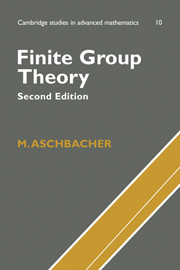Book contents
- Frontmatter
- Contents
- Preface
- 1 Preliminary results
- 2 Permutation representations
- 3 Representations of groups on groups
- 4 Linear representations
- 5 Permutation groups
- 6 Extensions of groups and modules
- 7 Spaces with forms
- 8 p-groups
- 9 Change of field of a linear representation
- 10 Presentations of groups
- 11 The generalized Fitting subgroup
- 12 Linear representations of finite groups
- 13 Transfer and fusion
- 14 The geometry of groups of Lie type
- 15 Signalizer functors
- 16 Finite simple groups
- Appendix
- References
- List of Symbols
- Index
16 - Finite simple groups
Published online by Cambridge University Press: 05 June 2012
- Frontmatter
- Contents
- Preface
- 1 Preliminary results
- 2 Permutation representations
- 3 Representations of groups on groups
- 4 Linear representations
- 5 Permutation groups
- 6 Extensions of groups and modules
- 7 Spaces with forms
- 8 p-groups
- 9 Change of field of a linear representation
- 10 Presentations of groups
- 11 The generalized Fitting subgroup
- 12 Linear representations of finite groups
- 13 Transfer and fusion
- 14 The geometry of groups of Lie type
- 15 Signalizer functors
- 16 Finite simple groups
- Appendix
- References
- List of Symbols
- Index
Summary
To my mind the theorem classifying the finite simple groups is the most important result in finite group theory. As I indicated in the preface, the Classification Theorem is the foundation for a powerful theory of finite groups which proceeds by reducing suitable group theoretical questions to questions about representations of simple groups. The final chapter of this book is devoted primarily to a discussion of the Classification Theorem and the finite simple groups themselves.
Sections 45 and 46 introduce two classes of techniques useful in the study of simple groups. Section 45 investigates consequences of the fact that each pair of involutions generates a dihedral group. The two principal results of the section are the Thompson Order Formula and the Brauer–Fowler Theorem. The Thompson Order Formula supplies a formula for the order of a finite group with at least two conjugacy classes of involutions in terms of the fusion of those involutions in the centralizers of involutions. The Brauer-Fowler Theorem shows that there are at most a finite number of finite simple groups possessing an involution whose centralizer is isomorphic to any given group.
Section 46 considers the commuting graph on the set of elementary abelian p-subgroups of p-rank at least k in a group G. The determination of the groups for which this graph is disconnected for small k plays a crucial role in the Classification Theorem.
Information
- Type
- Chapter
- Information
- Finite Group Theory , pp. 242 - 268Publisher: Cambridge University PressPrint publication year: 2000
